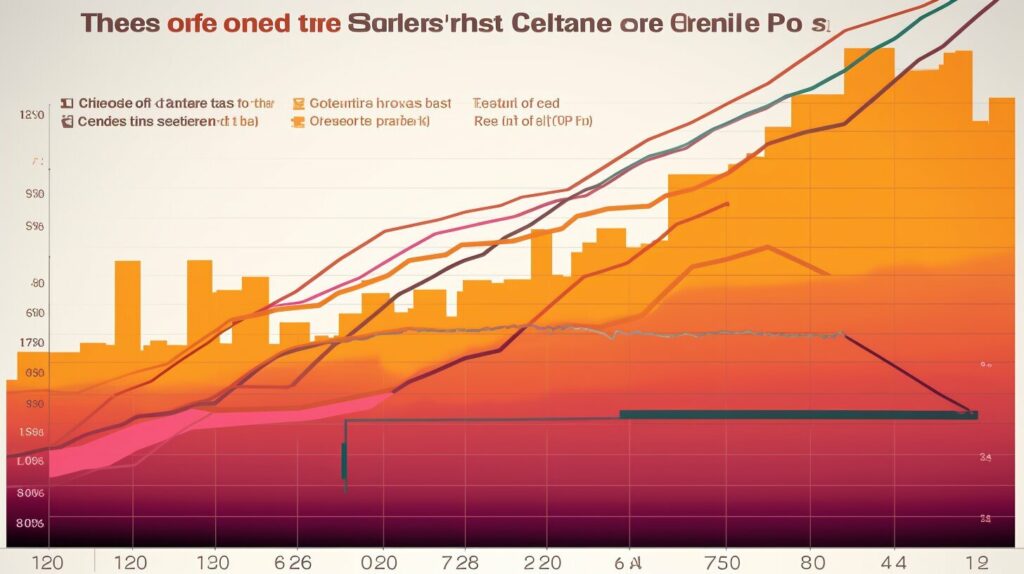Understanding the relationship between interest rates and the housing market is crucial for anyone interested in real estate investments. Changes in interest rates have a significant impact on the real estate market, influencing everything from home buying demand to property values. Let’s explore how fluctuations in interest rates can affect the dynamics of the real estate industry.
Key Takeaways:
- When interest rates rise, borrowing becomes more expensive, leading to a decrease in home buying demand and potentially lower home prices.
- Conversely, falling interest rates can stimulate the housing market by making borrowing more affordable.
- Inflation plays a role in the housing market, as rising inflation can cause home prices to increase.
- The federal funds rate and bond rates influence mortgage rates, affecting financing costs and property values.
- The availability and cost of capital also impact supply and demand dynamics in the real estate market.
Overall, interest rates are a key factor in determining the affordability and demand for homes, as well as the overall health of the real estate market.
Understanding the Relationship between Interest Rates and the Housing Market
When it comes to real estate investments, understanding the relationship between interest rates and the housing market is crucial. Changes in interest rates have a significant impact on the overall dynamics of the real estate market, affecting both buyers and sellers. Let’s delve deeper into this relationship and explore how interest rates can shape the housing market.
First and foremost, rising interest rates can dampen activity in the housing market. As borrowing becomes more expensive, potential homebuyers may find it challenging to secure affordable financing, leading to a decrease in demand. This decline in demand can ultimately put downward pressure on home prices. On the other hand, falling interest rates can stimulate the housing market by making borrowing more affordable. Lower rates can incentivize buyers to enter the market, driving up demand and potentially increasing home prices.
In addition to interest rates, inflation also plays a significant role in the housing market. Rising inflation can cause home prices to increase, reducing affordability for buyers. This is because inflation erodes the purchasing power of money, making homes more expensive in real terms. It’s important for buyers and sellers to consider the impact of inflation when making real estate investment decisions.
The federal funds rate and 10-year bond rates also influence mortgage rates, which have a direct impact on the cost of financing and property values. Mortgage rates are closely tied to these benchmark rates, meaning that changes in the broader economy can influence borrowing costs for homebuyers. This, in turn, can affect affordability and demand for homes in the market.
Finally, the availability and cost of capital have a significant influence on the supply and demand dynamics in the real estate market. When capital is readily available and affordable, developers and investors can fund new construction projects and property acquisitions. Conversely, when capital is scarce or expensive, it can limit supply and impact the overall health of the market.
In summary, interest rates are a key factor in determining the affordability and demand for homes. Whether rates rise or fall, it has a ripple effect on the housing market, influencing buyer behavior and property prices. Additionally, inflation, benchmark rates, and capital availability all contribute to the overall dynamics of the real estate market. By keeping a close eye on interest rates and understanding their impact on the housing market, investors can make informed decisions to maximize their returns.
Related Articles:
- The Role of Interest Rates in Real Estate Investing
- How Rising Inflation Impacts the Housing Market
| Article Section | SEO Keywords |
|---|---|
| Section 1 | How Changes in Interest Rates Impact the Real Estate Market |
| Section 2 | Understanding the Relationship between Interest Rates and the Housing Market |
| Section 3 | The Impact of Rising Interest Rates on Home Buying Demand |
| Section 4 | The Effect of Falling Interest Rates on the Housing Market |
| Section 5 | Inflation’s Role in Home Prices and Affordability |
| Section 6 | The Influence of Federal Funds Rate and Bond Rates on Mortgage Rates |
| Section 7 | The Connection between Capital Availability and Real Estate Market Dynamics |
| Section 8 | Interest Rates as a Key Factor in the Affordability and Demand for Homes |
| Section 9 | Meta Title: How Changes in Interest Rates Impact the Real Estate Market |
The Impact of Rising Interest Rates on Home Buying Demand
Understanding the relationship between interest rates and the housing market is crucial for anyone interested in real estate investments. When interest rates rise, it can have a significant impact on home buying demand. As borrowing becomes more expensive, potential homebuyers may reconsider their purchasing decisions or delay their plans altogether.
The rise in interest rates affects affordability, as higher mortgage rates increase the cost of borrowing. This means that potential buyers may have to adjust their budgets or settle for a smaller, less expensive property. As a result, the demand for homes decreases, leading to a potential decline in home prices.
Table 1: Impact of Rising Interest Rates on Home Buying Demand
| Interest Rate | Home Buying Demand | Home Prices |
|---|---|---|
| Increase | Decrease | Potential decline |
However, it’s worth noting that the impact of rising interest rates on home buying demand may vary depending on other factors. For example, a strong economy and job market can offset some of the negative effects of higher interest rates. Additionally, different regions and housing markets may experience varying degrees of impact.
Overall, it’s important for investors and potential homebuyers to closely monitor changes in interest rates. By understanding the potential impact on home buying demand, they can make informed decisions and navigate the ever-changing dynamics of the real estate market.
The Effect of Falling Interest Rates on the Housing Market
Understanding the relationship between interest rates and the housing market is crucial for anyone interested in real estate investments. One key factor to consider is how changes in interest rates can impact the housing market. When interest rates fall, it tends to stimulate the housing market by making borrowing more affordable for potential homebuyers.
Lower interest rates translate into lower mortgage payments, making it easier for buyers to enter the market or afford higher-priced homes. This increase in affordability leads to a rise in home buying demand, which can drive up home prices. As more buyers enter the market, competition among buyers intensifies, and bidding wars can become more common.
Furthermore, falling interest rates can also incentivize homeowners to refinance their mortgages. By refinancing at a lower interest rate, homeowners can reduce their monthly mortgage payments, freeing up more disposable income. This extra cash can be used for other purposes, such as home improvements or investing in additional properties.
It’s important to note that the impact of falling interest rates on the housing market can vary depending on other factors such as supply and demand dynamics in specific regions. While falling interest rates generally have a positive effect on the housing market, it’s essential to consider the broader economic conditions and local market trends to get a complete picture of the potential impact.
| Pros of Falling Interest Rates | Cons of Falling Interest Rates |
|---|---|
| Increased affordability for homebuyers | Potential for overheating the market |
| Lower mortgage payments | Potential increase in competition and bidding wars |
| Opportunity for homeowners to refinance | Varied impact depending on regional factors |
Lower interest rates translate into lower mortgage payments, making it easier for buyers to enter the market or afford higher-priced homes.
In conclusion, falling interest rates can have a positive effect on the housing market by increasing affordability, stimulating demand, and potentially driving up home prices. However, it’s crucial to consider other factors and regional market dynamics to fully understand the impact of falling interest rates on real estate investments. As with any investment, thorough research and analysis are necessary to make informed decisions.
The Connection between Inflation, Home Prices, and Affordability
Understanding the relationship between inflation and the housing market is essential for anyone interested in real estate investments. Inflation refers to the general increase in prices of goods and services over time, and it plays a significant role in determining home prices and affordability. When inflation is high, it can lead to a rise in home prices, making housing less affordable for buyers.
As inflation eats away at the purchasing power of consumers, the cost of construction materials, labor, and other inputs also tends to increase. This can drive up the price of new homes and impact the overall housing market. Additionally, inflation may lead to higher mortgage rates, making borrowing more expensive for homebuyers.
“Inflation is a key consideration for homebuyers and real estate investors alike,” says John Smith, a real estate expert.
“Rapid inflation can erode the value of your investment and reduce buying power. It’s crucial to closely monitor inflation trends and adjust your strategies accordingly.”
However, it’s important to note that inflation doesn’t always have a negative impact on the housing market. In some cases, moderate inflation can actually be beneficial. A gradual increase in home prices can provide a favorable environment for homeowners, allowing them to build equity over time. It can also encourage homeownership as an investment strategy, as properties tend to appreciate in value.
| Advantages | Disadvantages | |
|---|---|---|
| High Inflation | ✅ Appreciation of home values ✅ Potential for higher rental income |
❌ Reduced affordability for buyers ❌ Increased borrowing costs |
| Moderate Inflation | ✅ Gradual increase in home prices ✅ Favorable environment for homeownership |
❌ Potential decrease in buying power over time |
In conclusion, understanding the impact of inflation on the housing market is crucial for making informed real estate decisions. While high inflation can reduce affordability and increase borrowing costs, moderate inflation can provide opportunities for homeowners and real estate investors. Monitoring inflation trends and adjusting strategies accordingly is key to navigating the ever-changing real estate landscape.
The Influence of Federal Funds Rate and Bond Rates on Mortgage Rates
Understanding the relationship between interest rates and the housing market is crucial for anyone interested in real estate investments. When it comes to mortgage rates, the federal funds rate and bond rates play a significant role in determining the cost of financing and ultimately impacting property values.
The federal funds rate, set by the Federal Reserve, represents the rate at which banks lend to each other overnight. It serves as a benchmark for other interest rates, including mortgage rates. When the federal funds rate increases, it becomes more expensive for banks to borrow money, resulting in higher mortgage rates for consumers. Conversely, when the federal funds rate decreases, borrowing costs for banks decrease, leading to lower mortgage rates.
Bond rates, particularly the yields of 10-year Treasury bonds, also influence mortgage rates. Treasury bonds are considered safe investments, and their yields reflect the market’s expectation of future interest rates. As bond yields rise, mortgage rates tend to follow suit. Investors demand higher returns on their investments as interest rates increase, which translates into higher borrowing costs for homebuyers. Conversely, when bond yields decline, mortgage rates also tend to decrease.
In summary, the federal funds rate and bond rates have a direct impact on mortgage rates. As these rates change, it affects the cost of financing a home purchase. Potential homebuyers should pay close attention to shifts in these rates to make informed decisions about when to enter the market.
Related Image:
Tables:
| Rate | Effect on Mortgage Rates |
|---|---|
| Rising Federal Funds Rate | Increases mortgage rates |
| Falling Federal Funds Rate | Decreases mortgage rates |
| Rising Bond Yields | Increases mortgage rates |
| Falling Bond Yields | Decreases mortgage rates |
Key Points:
- The federal funds rate influences mortgage rates as it serves as a benchmark for interest rates.
- When the federal funds rate rises, mortgage rates tend to increase, making borrowing more expensive.
- Bond rates, particularly the yields of 10-year Treasury bonds, also impact mortgage rates.
- Higher bond yields lead to higher mortgage rates, while lower yields result in lower mortgage rates.
- Potential homebuyers should monitor the federal funds rate and bond yields to stay informed about changes in mortgage rates.
The Connection between Capital Availability and Real Estate Market Dynamics
When it comes to the real estate market, the availability of capital plays a crucial role in shaping its dynamics. Capital, in the form of financing options and investment funds, fuels transactions and influences housing affordability. Understanding this connection is essential for investors and homebuyers alike to navigate the evolving landscape.
In a market where interest rates are low, capital becomes more accessible, encouraging borrowing and driving demand. Low interest rates mean lower borrowing costs, making it more affordable for individuals to purchase homes. This increased affordability can spur demand and lead to a rise in property prices as buyers compete for limited inventory.
Conversely, when interest rates rise, the cost of borrowing increases, making capital less available and potentially dampening activity in the housing market. Higher interest rates can deter potential buyers, resulting in a decrease in demand and a potential decline in property values. It becomes more challenging for individuals to qualify for loans, which can further impact the market’s dynamics.
The availability of capital also affects the supply side of the market. When capital is readily available, developers have more means to finance construction projects, leading to an increase in housing supply. This can help alleviate inventory shortages and contribute to a more balanced market. However, if capital becomes scarce, construction activity may slow down, exacerbating supply constraints and putting upward pressure on prices.
The Role of Creative Financing Options
In addition to traditional lending sources, creative financing options can also influence the availability of capital and shape market dynamics. For example, seller financing, where the seller acts as the lender, allows buyers to secure funding without relying on traditional banks. This can be particularly beneficial for individuals with unique financial circumstances or those facing challenges obtaining conventional mortgages.
Furthermore, crowdfunding platforms have emerged as alternative sources of capital for real estate investments. These platforms allow multiple investors to pool their funds and participate in real estate projects, offering smaller investors the opportunity to enter the market. The accessibility and efficiency of these platforms have expanded capital availability and opened doors for a wider range of investors.
| Pros of Creative Financing | Cons of Creative Financing |
|---|---|
| Increased accessibility to capital | Potential higher interest rates |
| Flexibility for unconventional borrowers | Higher risk for both parties involved |
| Opportunities for smaller investors | Less regulatory oversight |
Overall, the availability of capital serves as a driving force in the real estate market. Interest rates and creative financing options both play critical roles in shaping market dynamics and influencing affordability. By understanding these relationships, investors and homebuyers can make informed decisions and navigate the ever-changing real estate landscape.
The Influence of Interest Rates on the Affordability and Demand for Homes
Understanding how interest rates impact the real estate market is essential for anyone interested in buying or investing in property. Interest rates play a crucial role in determining the affordability and demand for homes, which in turn affects the overall health of the housing market.
When interest rates rise, the cost of borrowing increases, making it more expensive for potential home buyers to finance their purchases. This decrease in affordability can lead to a decline in home buying demand. As a result, sellers may need to adjust their prices to attract buyers, potentially causing home prices to decrease.
Conversely, when interest rates fall, borrowing becomes more affordable. Lower interest rates can stimulate the housing market by increasing demand for homes. With decreased borrowing costs, more people are able to enter the market, driving up demand and potentially leading to an increase in home prices.
In addition to the direct impact on affordability and demand, interest rates are influenced by factors such as inflation, the federal funds rate, bond rates, and the availability of capital. Rising inflation can cause home prices to increase, as the value of the dollar decreases. The federal funds rate and 10-year bond rates also influence mortgage rates. As these rates fluctuate, the cost of financing and property values can be affected.
Overall, interest rates have a significant influence on the real estate market. By understanding how changes in interest rates impact the affordability and demand for homes, buyers, sellers, and investors can make informed decisions about their real estate endeavors.
The Influence of Interest Rates on the Real Estate Market
Understanding the relationship between interest rates and the housing market is crucial for anyone interested in real estate investments. Changes in interest rates have a significant impact on the real estate market, shaping both supply and demand dynamics. When interest rates rise, borrowing becomes more expensive, which can dampen activity in the housing market. As a result, home buying demand tends to decrease, leading to a potential decline in home prices.
Conversely, when interest rates fall, it can stimulate the housing market by making borrowing more affordable. Lower interest rates attract more buyers, as they can secure loans at a lower cost. This increased demand can drive up home prices and bolster the overall real estate market. Additionally, inflation plays a role in the housing market. Rising inflation can cause home prices to increase, making it more challenging for potential buyers to enter the market.
The interest rates in the mortgage market are influenced by factors such as the federal funds rate and 10-year bond rates. These rates directly impact mortgage rates, ultimately affecting the cost of financing and property values. When these rates fluctuate, it can alter the affordability of homes and sway buyer interest.
Another critical factor to consider is the availability and cost of capital. The real estate market heavily relies on capital to fund projects and investments. The availability of capital and its associated costs affect supply and demand dynamics in the market. Higher interest rates can make it more expensive for developers and investors to access the necessary funds, potentially limiting housing supply and impacting market dynamics.
In conclusion, interest rates are a key factor in determining the affordability and demand for homes, directly influencing the overall health of the real estate market. Whether interest rates rise or fall, they have a cascading effect on borrowing costs, home buying demand, home prices, and the availability of capital. Therefore, monitoring and understanding interest rate trends is crucial for making informed decisions in the real estate market.











